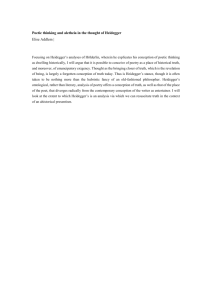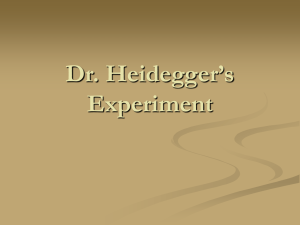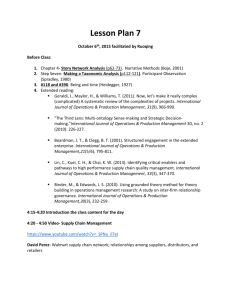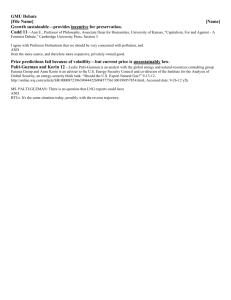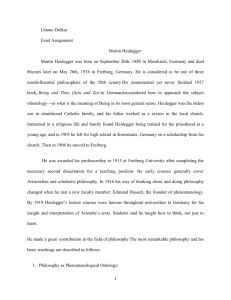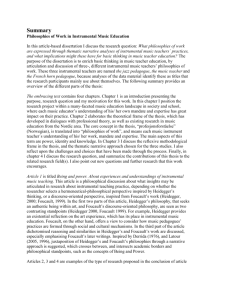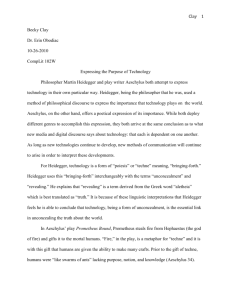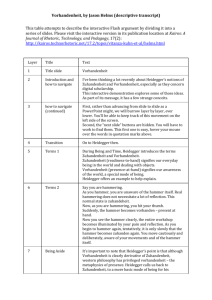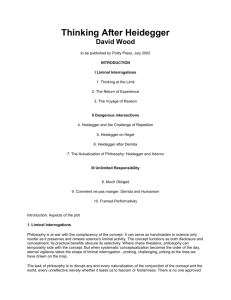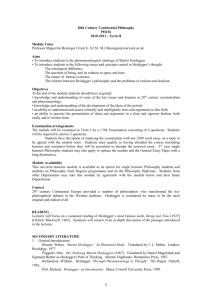20th-Century Continental
advertisement
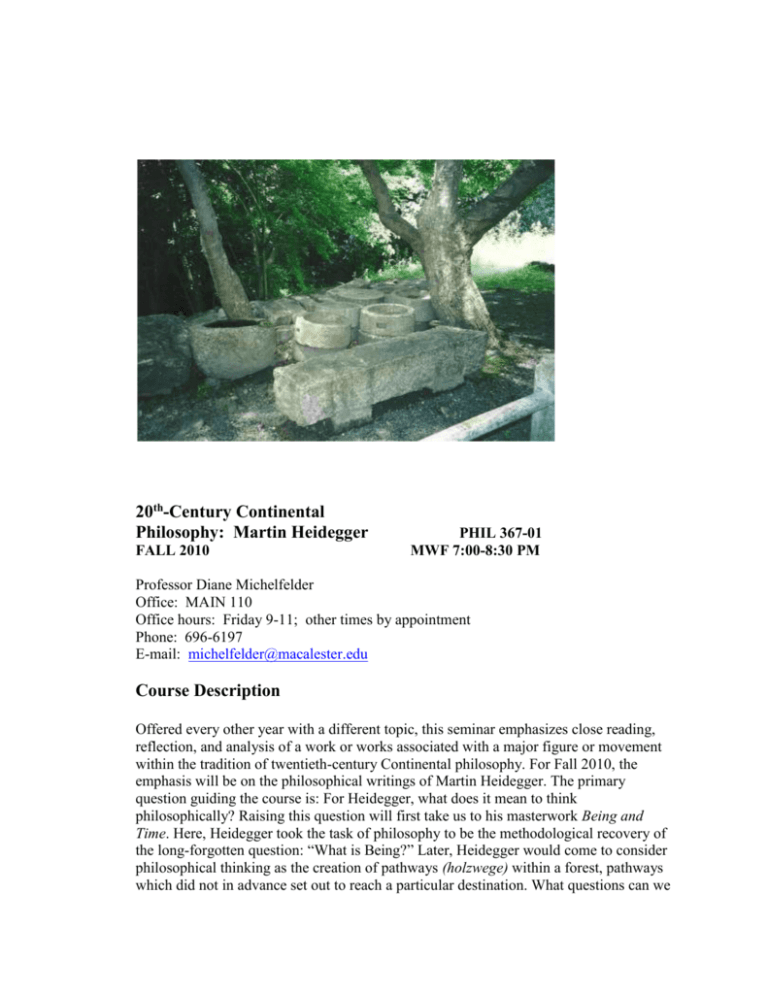
20th-Century Continental Philosophy: Martin Heidegger FALL 2010 PHIL 367-01 MWF 7:00-8:30 PM Professor Diane Michelfelder Office: MAIN 110 Office hours: Friday 9-11; other times by appointment Phone: 696-6197 E-mail: michelfelder@macalester.edu Course Description Offered every other year with a different topic, this seminar emphasizes close reading, reflection, and analysis of a work or works associated with a major figure or movement within the tradition of twentieth-century Continental philosophy. For Fall 2010, the emphasis will be on the philosophical writings of Martin Heidegger. The primary question guiding the course is: For Heidegger, what does it mean to think philosophically? Raising this question will first take us to his masterwork Being and Time. Here, Heidegger took the task of philosophy to be the methodological recovery of the long-forgotten question: “What is Being?” Later, Heidegger would come to consider philosophical thinking as the creation of pathways (holzwege) within a forest, pathways which did not in advance set out to reach a particular destination. What questions can we bring to our reading of Heidegger that would allow us to best approach and critically assess his work, complicated not only by the demands it makes on our understanding but also by his involvement with National Socialism? Our explorations in this course will take us through Being and Time (including significant parts of Division II), What is Called Thinking?, and a number of other essays. We will also be looking at the relationship between his philosophy and his politics through the eyes of the film The Ister and Richard Wolin’s book The Heidegger Controversy. The course will also incorporate readings from some well-known philosophers influenced by and critical of Heidegger’s work. Learning goals The learning goals for this course can be simply expressed. This course is designed to help you acquire a critical understanding of some of the major works of Martin Heidegger. It is intended to give you opportunities for becoming more practiced in the kinds of reading, talking, thinking, and writing that are part of the activity of “doing philosophy, “ and to help you become more aware of the questions and assumptions you bring to this activity. It is also intended to give you a greater appreciation of the genuine difficulties involved with doing philosophy, as well as its genuine pleasures. Required Texts Martin Heidegger, Being and Time. SUNY Press, 1996. _____________. Poetry, Language, Thought. Harper Perennial Classics, 2001. _____________. The Question Concerning Technology and Other Essays. Harper Perennial Classics, 1977. ______________. What is Called Thinking? Harper Perennial Classics, 2004. Richard Wolin, The Heidegger Controversy, MIT Press, 1993. Recommended Reading Mark Wrathall, How to Read Heidegger. W.W. Norton, 2005. (This book is strongly recommended for those of you who have not read any selections from Heidegger’s work prior to participating in this course.) Academic Integrity In reviewing your work, I will adhere to the College’s Academic Integrity Policy as published in the Student Handbook. Through the gift of your attention, you also help support the integrity of the academic environment. For your own sake and for the sake of others when we are in class together please refrain from texting, tweeting, and the like. Coursework For this course, you will be asked to submit four written papers. The first paper, 5-7 pages in length, will give you an opportunity to reflect on a topic that interests you from Being and Time. The second, 3-5 pages long, will ask you to compare Heidegger’s mode of philosophical questioning in What is Called Thinking? to that in B&T. The third paper, 5-7 pages, will be a critical analysis of one of Heidegger’s later essays. The fourth and last paper, which can be turned in through the time of our final exam, will be a 10-15 page research paper on a topic of your choosing from either B&T, one of the later works that we are reading for this class, or both. You will have the option of rewriting the first and third papers in order to improve your grade. Should you choose to rewrite your paper, it will be due one week after you receive your comments on your first paper. Unexcused late papers will be accepted up to one week after the due date, but you will lose half a grade (e.g. A- to B+) on the first day your paper is late, and every two days thereafter. Coursework evaluation Your final grade for this class will be based on the following percentages: First paper Second paper Third paper Term paper Class participation 20% 15% 20% 30% 15% By “class participation” I do not mean showing up for class but rather active engagement during class meetings: raising questions, taking part in discussions, etc. In this context, it is not how often you speak but what you say that matters. . Schedule of Topics, Readings, Exams, and Paper Due Dates Please note this schedule may change at the discretion of the instructor. Week One 8 September Welcome and introduction to the course Reading: Martin Heidegger, Being and Time, pp.1-12 Week Two 13 September Da-sein and the structures of disclosedness Being and Time, pp.107-139 15 September Care Being and Time, pp. 156-196 Week Three 20 September Everyday and authentic being-toward-death Being and Time, pp.219-246 22 September Resoluteness Being and Time, pp.246-277 Week Four 27 September The meaning of care Being and Time, pp.279-306 29 September Temporality and everydayness Being and Time, pp.307-340 Week Five 4 October Time to reflect on Being and Time as a whole. What is included and, just as importantly, what is missing? 6 October Introduction to Metaphysics, Chapter 1, “The Fundamental Question” (on library reserve) First Paper Due Week Six 11 October What is Called Thinking?, Part I, Lectures 1 through 5 13 October What is Called Thinking?, Part I, Lectures 6 through 10 Week Seven 18 October What is Called Thinking? Part II, Lectures 1 through 5 20 October What is Called Thinking? Part II, Lectures 5 through 11 Week Eight 25 October “The Question Concerning Technology,” in The Question Concerning Technology and Other Essays, pp.3-35. 27 October “The Question Concerning Technology, “ cont’d Andrew Feenberg, “Technology and Meaning,” from Questioning Technology (on e-reserve) Second Paper Due Week Nine 1 November “The Age of the World Picture,” in The Question Concerning Technology and Other Essays, pp. 115-136 3 November We will be viewing selections from the The Ister. For more information on this film, see www.theister.com Week Ten 8 November We will continue our viewing of The Ister, followed by discussion. Refreshments provided. 10 November Richard Wolin, The Heidegger Controversy, pp.29-39, 61-66 Note: Wolin’s introduction to this book, pp. 1-19, is highly recommended Week Eleven 15 November Paul Lőwith, “The Political Implications of Heidegger’s Existentialism,” in The Heidegger Controversy, pp.167-185 17 November Jacques Derrida, selections from Of Spirit: Heidegger and the Question (on e-reserve) Third Paper Due Week Twelve 22 November “The Origin of the Work of Art,” in Poetry, Language, Thought, pp.1748 24 November “The Origin of the Work of Art,” pp.48-86 Week Thirteen 29 November “Overcoming Metaphysics,” in The Heidegger Controversy,” pp.67-90 1 December “Building, Dwelling, Thinking,” in Poetry, Language, Thought, pp.143159 Week Fourteen 6 December “…Poetically Man Dwells…” in Poetry, Language, Thought, pp.211227 8 December Hans-Georg Gadamer, “Subjectivity and Intersubjectivity; Subject and Person”; selections from A Century of Philosophy: Hans-Georg Gadamer in Conversation with Richard Dottori (on e-reserve) Week Fifteen 14 December Philosophy pizza night and course wrap-up Reading: “Only a God Can Save Us,” in The Heidegger Controversy, pp. 91-116 *************************************** 15 December Term Papers Due Please turn your term paper in to me in my office by 6 pm
